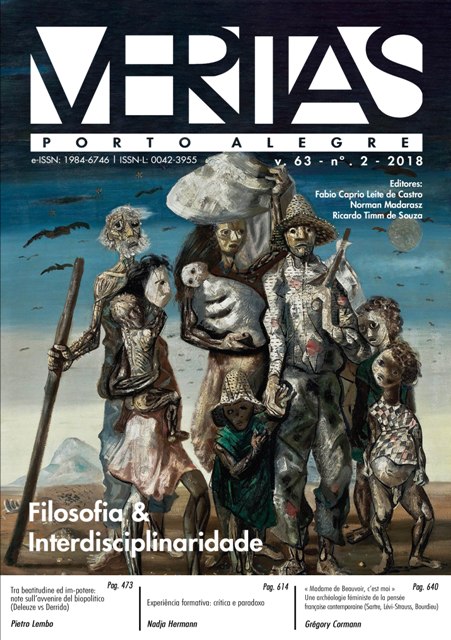Present Critical Criminology: Criminological Thought, Social Control and Institutional Violence
DOI:
https://doi.org/10.15448/1984-6746.2018.2.30790Keywords:
Critical Criminology – Critical Theory – Frankfurt School – Institutional ViolenceAbstract
This paper analyses current debates in the Critical Criminology field, through its emergence during the Frankfurt School, and the link between the development of the critical criminology knowledge and the criticism of institutional violence. By introducing the differences between traditional and critical theories, the essay points out the relation between legal and instrumental reasons, and considers authors that did not belong to the main circle of the Frankfurt School and dealt with criminological issues (Rusche, Kirchheimer, Neumann and Fromm). To conclude, the paper proposes ways to apply critical knowledge in the Criminology and Criminal Law fields.Downloads
References
Adorno, Theodor W. & Horkheimer, Max. Dialética do Esclarecimento. Rio de Janeiro: Zahar, 1985.
Adorno, Theodor W. Educação após Auschwitz in Adorno: textos escolhidos. São Paulo: Ática, 1986.
Arendt, Hannah. Eichmann em Jerusalém: um relato sobre a banalidade do mal. São Paulo: Companhia das Letras, 1999.
Benjamin, Walter. Sobre a Crítica do Poder como Violência in O Anjo da História. Belo Horizonte: Autêntica, 2012.
Frankenberg, Günter. Teoría Crítica in Academia: Revista sobre Enseñanza del Derecho, v. 09, n. 17, 2011.
Fromm, Erich. O Medo à Liberdade. 14. ed. Rio de Janeiro: Editora Guanabara, 1983.
Fromm, Erich. On the Psychology of the Criminal and the Punitive Society in Anderson, Kevin & Quinney, Richard (eds.). Erich Fromm and Critical Criminology: beyond the punitive society. Chicago: University of Illinois Press, 2000.
Fromm, Erich. Psicanálise da Sociedade Contemporânea. São Paulo: Circulo do Livro, 1985.
Fromm, Erich. The State as Educator: on the Psychology of Criminal Justice in Anderson, Kevin & Quinney, Richard (eds.). Erich Fromm and Critical Criminology: beyond the punitive society. Chicago: University of Illinois Press, 2000.
Horkheimer, Max. Teoria Tradicional e Teoria Crítica in Benjamin, Horkheimer, Adorno & Habermas: Textos Escolhidos. 2 ed. São Paulo: Abril Cultural, 1983.
Marx, Karl. Manuscritos Econômicos-Filosóficos. São Paulo: Boitempo, 2010.
Mascaro, Alysson Leandro. Filosofia do Direito. 4. ed. São Paulo: Atlas, 2014.
Matos, Olgária. A Escola de Frankfurt: luzes e sombras do Iluminismo. São Paulo: Moderna, 1993.
Neumann, Franz. Behemoth: the structure and practice of national socialism, 1933-1944. Chicago: Dee Publisher, 2009.
Neumann, Franz. O Império do Direito: teoria política e sistema jurídico na sociedade moderna. São Paulo: Quartier Latin, 2013.
Neumann, Franz. Rechtsphilosophische Einleitung zu einer Abhandlung über das Verhältnis von Staat und Strafe. Diss. jur., Frankfurt am Main, 1922.
Pandolfo, Alexandre Costi. A Criminologia Traumatizada: um ensaio sobre violência e representação dos discursos criminológicos hegemônicos no século XX. Rio de Janeiro: Lumen Juris, 2010.
Souza, Ricardo Timm. A Escola de Frankfurt e o Contexto do seu Surgimento: inquietações éticas no coração dos dilemas de uma época in Adorno & Kafka: paradoxos do singular. Passo Fundo: IFIBE, 2010.
Souza, Ricardo Timm. O Nervo Exposto: por uma crítica da razão ardilosa desde a racionalidade ética in Anuário do Programa de Pós-Graduação em Filosofia da PUCRS. Porto Alegre: EDIPUCRS, 2015. DOI: https://doi.org/10.15602/2525-3883/jso.n1p53-66
Downloads
Published
How to Cite
Issue
Section
License
Copyright
The submission of originals to Revista Veritas implies the transfer by the authors of the right for publication. Authors retain copyright and grant the journal right of first publication. If the authors wish to include the same data into another publication, they must cite Revista Veritas as the site of original publication.
Creative Commons License
Except where otherwise specified, material published in this journal is licensed under a Creative Commons Attribution 4.0 International license, which allows unrestricted use, distribution and reproduction in any medium, provided the original publication is correctly cited. Copyright: © 2006-2020 EDIPUCRS</p






